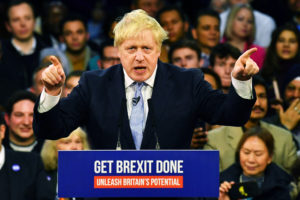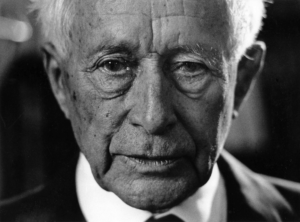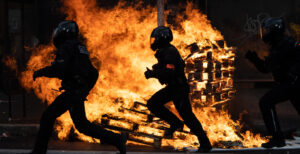Born in 1945, from the wreckage of its decades-long civil war, our mother continent Europe is a boomer, prone as many boomers are to comforting and self-aggrandising myths as it slouches towards death. Unlike the generation which led Europe through the Cold War, which had lived through Europe’s great convulsion and understood power, the generation of politicians which led Europe through the post-Cold War decades — a type of which Angela Merkel, once lauded and now reviled, is the purest distillation — were the first to have fully internalised the continent’s post-1945 value system.
Power politics was a barbarous relic of a rejected past; the world was destined to move towards harmonious free trade, in which Europe’s hard-won moral clarity would guide lesser civilisations, still trapped in history, towards the light. Timid, comfortable, fearful of change and obsessed with petty rules and regulations, once Europe reached middle age with the collapse of the Soviet Union, it was happy to observe a changing world tutting from behind its net curtains, the parish council Nimby of continents. Half museum and half retirement home, Europe grew fat and complacent as history was made elsewhere. But from a cave in the depths of Asia something stirred, which would restart history: Covid fatally weakened the boomer continent, and now something new is straining to be born.
It is striking that it took a disease which primarily affects the elderly and unfit to finally make Europe’s leaders notice what had already been clearly apparent: that the continent’s willed deindustrialisation in favour of China had left it weak and helpless, entirely dependent on the charity and vigour of stronger empires. The conjunction of Covid with America’s worst period of internal political disorder since the Sixties also fed a perception among America’s rivals that the global hegemon was itself ailing in turn, fuelling Putin’s decision to invade Ukraine. Yet if Putin’s war has been markedly unsuccessful on the battlefield, in a pyrrhic sense it has proved the validity of the central assumption driving it: that the post-Cold War world is dead, and we already live in a multipolar order.
In the Middle East, South America, Africa and Asia, even America’s allies remain happy to trade with Russia and submit their disputes to Chinese arbitration, viewing the Ukraine war as a distant European border skirmish irrelevant to their interests, and America’s role as global policeman lost to history. Only now are EU leaders, such as its chief diplomat Josep Borrell Fontelles, able to face the dawning realisation that “many countries see the geopolitical influence of China as a counterweight to the West and therefore to Europe. They will seek to strengthen their own room for manoeuvre without picking sides”. The latest war in Europe thus helps mark the boundaries of a European civilisational space, delineated by solidarity with Ukraine. For decades, Europe’s leaders flattered themselves that their moral worldview was universal, fated by history to reshape the entire world. Instead, Europe’s values and its interests are revealed as utterly parochial: merely the customs and assumptions of one civilisation among many, and a weak one at that.
It took both crises, Covid and Ukraine, to awaken Europe from its post-war dream. Dependent on China for industry, Russia for energy and America for security, Europe suddenly realised its vulnerability within the new order. As Macron recently wrote in the Financial Times: “because of the Covid-19 pandemic and the war Russia decided to inflict on Ukraine, we have acknowledged our strategic dependencies and decided to act to reduce them… We are no longer naive.” Rejecting the idealistic free-trade dogma that had dominated European thinking for decades, Macron further argued in a landmark speech that “we are not destined to become consumers of American industry”, nor is Europe’s relationship to China a choice between economic subjection and conflict: “Rather than trying to fight the Chinese, we are going to do the same as they do: defend our European sovereignty and produce what we need in Europe.”
In a strange way, Macron’s civilisational dream of Europe’s role in a multipolar world echoes the foreign policy thinking of the two giants of Germany’s interwar Conservative Revolution, Carl Schmitt and Ernst Jünger. Writing from very different perspectives, just as Germany’s bloody attempt to unify the continent began to look doomed, the two friends tried to visualise a new place for Europe in the world. For Jünger, in his long essay “The Peace”, begun in 1941 and secretly circulated amongst the Wehrmacht generals plotting to assassinate the Führer he so despised, the historical result of the Second World War would not be a reversion to the pre-war order of squabbling nation states brought about by Versailles, but instead the consolidation of the earth’s continents into great civilisational power blocs: “For the first time, the earth as a globe, as a planet, has become a battlefield, and human history presses on towards a planetary order.”
This was a moment of great danger for Europe, Jünger warned: “Napoleon prophesied that in our day the world would become republican or Cossack. If he had foreseen our situation in detail he would have said ‘American or Russian’”, for “at the moment when Europe raises itself to the status of a continent, the gravitational pull of America will become more perceptible”. For Jünger as for Macron, history presented the mother continent with a great and fateful choice: vassalisation at the hands of one of the two great empires, or an autonomous civilisation state.
Instead, for Jünger, Germany’s defeat was also the moment for “Europe’s Declaration of Independence”, a time when “the old frontiers must be broken down by new alliances, and new, greater empires must unite the nations”. Here, Jünger does not sound markedly different to Macron in declaring that “Europe must become a partner in the great empires which are forming on this planet, and are striving towards their final form.”
Indeed, like Macron, the Francophile Jünger believed this should happen under French tutelage, as “for long the spirit of that country has been striving towards greater unity in which its labours too will be crowned”. Like Macron’s summoning of the Napoleonic spirit, Jünger celebrated the previous failed champion of a great continental empire: “For this reason secret shrines in honour of Napoleon have been maintained in all lands — for in that prince the old dream of one great monarchy had seemed to be realised.” No wonder Mitterand, meeting the Right-wing warhorse turned idealistic prophet of European unification in 1984, would remark that “Napoleon would have made you a marshal”.
Never quite rejecting his early Right-wing radicalism, the later Jünger directed it towards a pan-European identity and political Catholicism, and died lauded as a prophet of European unification and the Franco-German alliance. Jünger’s ideal European union indeed prefigures our own, where “there should be uniformity of organisation in whatever concerns technical matters, industry, commerce, communications, trade, weights and measures, and defence”, where “the state as supreme symbol of technical achievement takes the nations in its toils, yet they live in freedom under its protection”. Like his fellow Nietzchean, Macron, who views Russia’s invasion of Ukraine as the catalyst to reform Europe into a continent capable of defending itself and preserving its unique civilisation, Jünger observes that: “it is thus that nature fashions shellfish, with a hard, gleaming embossed shell and a delicate interior in which the pearls are hidden. In this differentiation lies the welfare of states and the happiness of individuals.”
Jünger’s vision of a new world order divided into great continental empires reflects the influence of his best friend, the jurist and legal philosopher Carl Schmitt. Unlike Jünger — a fierce and public opponent of Hitler’s regime — Schmitt famously attempted to find a starring role for himself under the National Socialist order, quietly rejecting it only when Germany’s defeat looked certain. It is ironic, and perhaps based on a cursory reading of Jünger’s earlier works, that while Jünger’s reputation is clouded (or among some fans today, enhanced) by his early Right-wing radicalism, Schmitt’s dalliance with the regime whose atrocities created the post-1945 order has only granted his work a certain transgressive glamour, particularly among the Marxist and post-Marxist intellectuals who first revived his thought.
In The Nomos of the Earth (1952), Schmitt observed that the decisive event in world history came at the end of the 16th century, when “the British island detached itself in ideal terms from the destinies of the continent to undertake its own adventure on the seas”. The result was the creation of great seaborne empires, finally culminating in the United States, with the power and will to impose their order on the entire planet, relegating the Europe from the engine of world history to the scene of pitiless and total wars. In detaching itself from the continent, Britain set in train a sequence of events that would lead to Europe’s subordination to Britain’s monstrous child, America.
Yet for Schmitt, in his later writings, there were alternate historical paths on the horizon. As perhaps his most famous modern acolyte, the post-Marxist political theorist Chantal Mouffe, observes, Schmitt looked beyond the bipolar Cold War order he would not outlive to a world where the likely end of bipolarity, American hegemony, would in turn be superseded by “a new global order based on the existence of several autonomous regional blocs”. For Mouffe, a multipolar landscape of civilisational blocs would likely be more stable and pacific than American unilateralism, by dividing the world into distinct but broadly amicable spheres of influence (Ukrainians and Taiwanese, both unwilling members of other empires’ chosen spheres of influence, are unlikely to share her enthusiasm).
A critic of the War on Terror (whose own Schmittian basis has famously been argued by Agamben), Mouffe argued that the potential for world peace brought about by a “a pluralistic world order” is why, “against the illusions of the universalist-humanitarians, it is urgent to listen to Schmitt when he reminds us that ‘the political world is a pluriverse, not a universe’”. Rejecting cosmopolitan idealism, Mouffe argues that we should abandon “the illusory hope for a political unification of the world”. Trying to turn the world into Europe is futile and dangerous: “instead of the vanguard in the unification of the world, the EU should be visualised as a regional pole in this multipolar world”.
In this multipolar order, as Jünger observed of a united Europe acting as the shield of nations, the EU would, “instead of being seen as announcing the end of nation-states, [provide] the conditions for their survival in a globalised world”. The continent’s survival in this post-cosmopolitan order, Mouffe declares, would entail a rejection of the ideology of free trade, which has meant that “an increasing number of vernacular industries have been destroyed, as local producers are unable to compete with cheap imports” from China and other rival powers. Instead, it is necessary to “to defend a Left-wing form of European protectionism”, in which it is essential “to envisage economic development according to a regional perspective”. This vision, of a protectionist, reindustrialised Europe is precisely that now championed by Macron, who recently announced that “we cannot be the last remaining market without an industrial policy”. In the stirring conclusion to his Financial Times essay, he declared that:
“We have to take back control of our supply chains, energy and innovation. We need more factories and fewer dependencies. ‘Made in Europe’ should be our motto. We have no choice, as sovereignty is intertwined with the strength of our democracies… We Europeans can prove that our continent, the cradle of the Industrial Revolution, can once again be the home of flourishing industry and shared progress.”
The post-1945 order, in the simplistic folk wisdom that only fully took shape with the fall of the Soviet Union, adopted the comforting myth that the Allied victory in the Second World War, like the Western victory in the Cold War, was a product of superior liberal-democratic forms. Shedding their overseas possessions in the decades following the war, Europeans flattered themselves that the age of empires was over, but that even as their physical power waned, their moral example would still guide the world.
Instead, the consolidation of the world into continental empires was only beginning. Political morality does not come into the picture: Europe’s conquest and post-war division into two rival spheres was simply the product of America and the Soviet Union’s vast industrial output, and the abundant raw materials, derived from ruthless territorial expansion and genocide in the preceding centuries, which enabled them to feed their factories.
Power flows through a million factory chimneys, and both Covid and the war in Ukraine have revealed to Europe’s feckless and misguided rulers how weak our continent has allowed itself to become. But both crises have also finally brought that fragile, complacent boomer, the world born in 1945, to a close: the entire worldview of its political avatar, Angela Merkel, now stands repudiated, even if no fully-formed replacement has yet arrived. First there were two rival empires, then one unchallenged hegemon, and now a series of potential challengers stand on history’s stage. Belatedly, European leaders are realising that unless it can defend itself, and provide for itself, then as Macron warned, “Europe will disappear.”
Disclaimer
Some of the posts we share are controversial and we do not necessarily agree with them in the whole extend. Sometimes we agree with the content or part of it but we do not agree with the narration or language. Nevertheless we find them somehow interesting, valuable and/or informative or we share them, because we strongly believe in freedom of speech, free press and journalism. We strongly encourage you to have a critical approach to all the content, do your own research and analysis to build your own opinion.
We would be glad to have your feedback.
Source: UnHerd Read the original article here: https://unherd.com/





